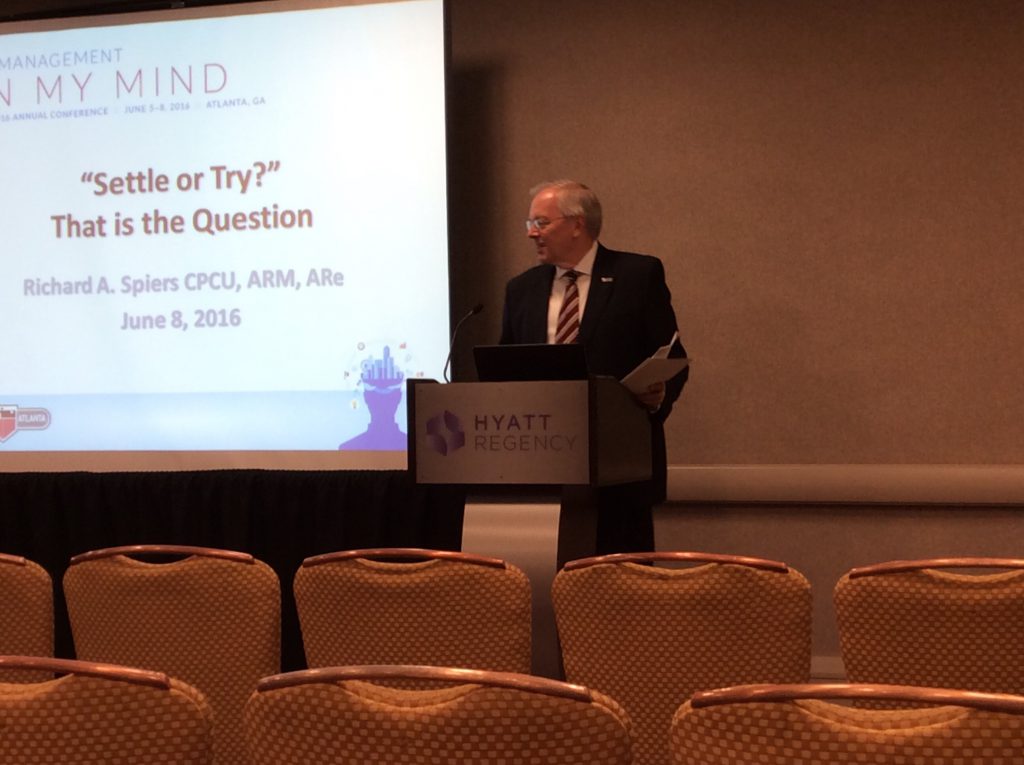Settlement or Trial
At the 2016 PRIMA Annual Conference, Richard Spiers from Genesis Management and Insurance services discussed the decision process on whether to take claims to trial or pursue settlement.
Why trial?
Sometimes a trial is your only alternative due to excessively large demands, unclear and unproven facts that sound bad, or damages that are larger than anticipated. Uncooperative showboating attorneys also can result in taking things to trial unnecessarily as they are trying to make a name for themselves.
Why settle?
Sometimes settlement makes the best economic sense as the settlement can be significantly less than the trial costs or trial exposures. Settlement also limits the negative publicity potential of the case. It is also important to be aware of surrounding issues on the case as public perceptions could impact the jury pool.
Important things to consider when deciding trial vs settlement:
- Your reputation – What was the publicity surrounding the initial occurrence? Have you had previous similar situations? You also have to consider the politics and overall economics of the situation.
- Plaintiff attorney reputation – Well known attorneys can raise the value of the case. The public may know them because of advertising. These attorneys may have previously obtained highly publicized large verdicts.
- The venue – Every year there is a list “Judicial Hell Holes” published and it is pretty much impossible for a defendant to get a fair trial. You also need to understand the specifics of the state law you are in. In Federal court you will owe attorney fees on top of any award. Finally it is important to know the jury pool in the area.
- Immunities and tort caps – Sometimes on paper it appears the caps will apply but in reality in the courtroom these caps may not hold up. Waivers also often times do not hold up in court.
Costs of defense through trial – Taking a case to trial is expensive including attorney fees, expert fees, and your staff time participating in the trial. You also have to consider the reputation costs from bad publicity around the trial. - Emotional aspects – If the case involves strong emotional issues such as sexual molestation it can decrease the chances of you getting an objective jury.
- Local and national news – The media can skew public perception of the issue long before trial happens. Also, you need to know the public’s attitude toward their local government as those people are your jury pool. Issues like tax increases or pension problems can taint a jury pool’s attitudes toward the municipality.
- Verdict potential – A mock jury can teach you many things about your verdict potential and the issues the jury may focus on. You must have a firm understanding of things that can impact the verdict such as length of the trial and previous awards in the venue.
Other issues to consider:
Discussions around settlement vs trial need to involve everyone potentially impacted by the case. This includes risk managers, city council, school boards, attorneys, and the carrier’s providing the insurance coverage.
It is also very important to fully understand the potential ramifications of a trial. Would you rather explain a $100,000 settlement or a $1 million jury verdict? Also, a large adverse verdict can set precedent for future cases. Finally, you need to know your insurance policy limits. If you can settle within limits but have trial exposure above those limits it probably makes sense to aggressively pursue settlement.
Resolution Strategies to Consider:
- Putting real money on the table can get things moving. Emphasize that settlement gets money to the plaintiff much sooner than trial.
- Pending motions can open the door for settlement negotiations.
- Offers of Judgement in Federal Court will restrict attorney fees if the award comes in at or below the offer.
- Mediation can be an effective tool but only if you have a good mediator and both parties participate in good faith. Mediator choice is an important factor to consider. It is important to learn what you can about the plaintiff and their family before the mediation so you can gauge what things are important to them.
- Alternative dispute resolutions such as structured settlements can be helpful especially when the case involves a younger child. This would allow you to defer some money for the child’s college education, etc.


